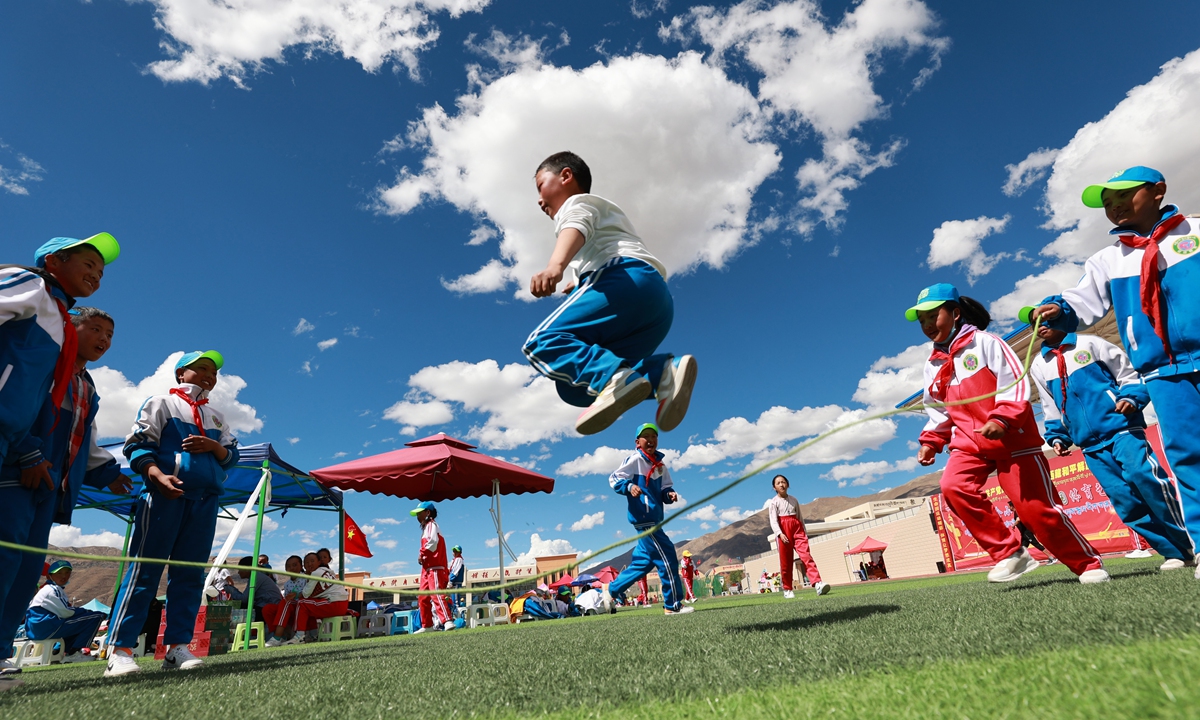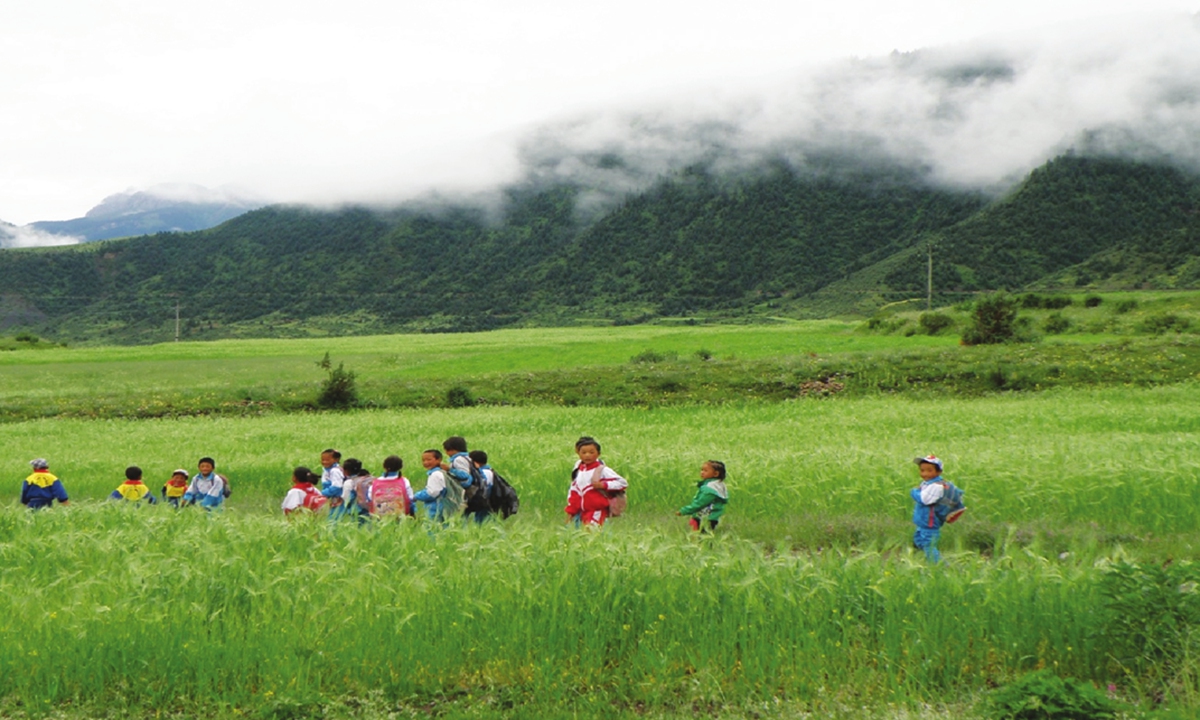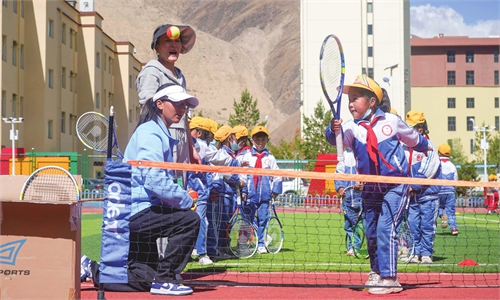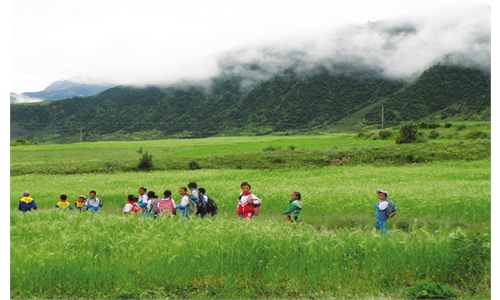Westerners should focus on eliminating inequalities in their societies instead of concerning themselves with Tibetan matters

Primary school students practice jumping rope in Shannan Prefecture, Xizang Autonomous Region on June 15, 2021. Photo: VCG
Beginning last month, as a result of three "UN special rapporteurs" grossly misinterpreting the situation of boarding schools in China's Xizang (Tibet), the Western media outlets have launched a new smear campaign, claiming that "one million Tibetan children have been forcibly separated from their families" and "forcibly assimilated" in Tibetan boarding schools, adding that Tibetan boarding schools are subjected to "forced assimilation" in these media outlets smeared as an effort to "assimilate Tibetan people culturally, religiously and linguistically into majority Han culture."If such smears can be tolerated, what cannot?
Xizang has a population of about 3.6 million people , where could a million boarding school students come from? Do they even use their brains when they make up such a story? In boarding schools all over China, students go home every weekend and all holidays, regardless of where they live, and spend their summer and winter vacations with their parents and families, living in their own familiar environment.
In the "colonial boarding school" in Canada, Canadian indigenous children were admitted and isolated from the rest of the world. There is no such a thing in China. The two are very different concepts. Some in the West have compared Tibetan boarding schools to the infamous prison-like education of indigenous children in North American colonial history, where the discovery of mass graves of children in those early colonial "boarding schools" is appalling. Some Western opinion elites have tried to stigmatize the term "boarding school" in Xizang, scrutinizing education in Xizang today through the barbaric history of Western colonial boarding education.
Many boarding schools have sprung up throughout China over the years, and China's Compulsory Education Law provides that county-level people's governments shall set up boarding schools as needed to ensure that children living in scattered areas are enrolled in education. The Regional Ethnic Autonomy Law also contains similar provisions, requiring the establishment of boarding-oriented schools to help children of ethnic minorities living in scattered areas to complete their compulsory education. This is a well-intentioned effort by the Chinese government to ensure that all children of school age receive a full compulsory education. Boarding schools are generally welcomed by parents and students because of the good living conditions and convenience of learning.
There are more boarding schools in Xizang because of its vast land and the fact that the population is more scattered than in the mainland, so boarding schools are especially popular because they fit well with the geographical situation in Xizang. Those students only live in school from Monday to Friday, and live with their families for about half of the time, counting in weekends, holidays plus summer and winter vacations, and they can keep in touch with their families by phone while they are at school, and parents can come to visit their children at any time. And it is very important to note that these boarding schools are not completely boarding as there are many children who live next to the school who go home every day. The Chinese definition of a boarding school tends to be that if it has 60 percent boarding students, it will be classified as such.
Western public opinion is extremely prejudiced against China's ethnic policy. The preferential policies enjoyed by China's ethnic minorities in terms of education and childbirth in previous years are completely ignored by them. They are hostile to China's policies of ethnic unity, and when a few "scums" engage in extremist or even terrorist acts, Western public opinion touts them as "resistance.

Primary school students on their way to school in Qamdo, Xizang. Photo: Zhaluo
I would like to say that to protect the rights of Tibetans, China has established the vast Xizang Autonomous Region, as well as Xizang autonomous prefectures and counties in other provinces. The area of Indian reservations in the US is 225,000 square kilometers, which is only a fraction of the 1.2 million square kilometers of the Xizang Autonomous Region, which shows that autonomy of Xizang is autonomy that local people are masters, and is completely different from the fate of Native Americans who were suppressed as the indigenous people. When tourists travel to the Xizang Autonomous Region or other autonomous prefectures in other provinces, they are greeted with the local ethnic flavor. Chinese people from the mainland love to visit Xizang because of the strong local Tibetan cultural atmosphere. Chinese society as a whole wants to preserve the unique culture of each ethnic group everywhere, and there is no will in Chinese society to assimilate the Tibetan people. What is the point of making Xizang look like the mainland? The local people also want to harmonize the modernization of their lives with the preservation of their traditional ethnic culture, and the attitude inside and outside Xizang is highly consistent.Regarding Tibetan children learning Putonghua, the official language of China, is that strange? Would native Americans not learn English? In China, if the children of any ethnic group don't learn Putonghua, they have to stay in their small world of origin, they simply can't get out their small isolated original place, and are easily abandoned by the times. Therefore, in Tibetan areas of China, no one is against children learning Chinese at all, and bilingual education is sincerely welcomed.
Nowadays, under Chinese compulsory education, children start learning English from the first grade, because it helps to increase the competitiveness of children when they grow up, and parents all support it. Should this be seen as China proactively accepting "assimilation"? The realistic motivation and demand for Tibetan children to learn Putonghua is much greater than that for Chinese people to learn English, because Putonghua is the common language in China and the largest language carrier for the functioning of Chinese society. Learning Putonghua does not mean giving up learning Tibetan. Those schools use bilingual education, and children learn Tibetan language from the moment they enter school until they graduate. And Tibetan is the official language of the Xizang Autonomous Region alongside Putonghua. Moreover, it is the language commonly used by local people. Local Han Chinese, especially Han Chinese officials, are encouraged to learn Tibetan at the same time.
Is there discrimination against ethnic minorities in China? The UN "special rapporteur" should come to the Chinese mainland and ask the same question. Ordinary Chinese people know that they should respect their ethnic minority friends and their customs in their lives, and that they should not let their words or actions affect national unity. There is absolutely no room for ethnic discrimination in China. In my view, some Westerners' imagination of Tibetan culture and customs is precisely discriminatory.
For example, in an article accusing Tibetan boarding schools, Time Magazine describes that "traditionally, Tibetans rarely washed, believing it bad for their health (at the high altitude's icy temperatures, maybe with some justification). It is also a matriarchal society, where women have been able to choose to bear children with several different lovers without reproach." They probably want the Tibetan people to remain "pristine" like the primitive tribes, to satisfy the curiosity of Westerners and to be enjoyed by them. They don't even think that Tibetans have the human right to enjoy modern civilization.
That's enough! Xizang is a unique but normal human society, not a museum showing Tibetan barbaric and backward serfdom culture. A socialist China is people-centered, and all ethnic groups will be truly respected and protected. The Western people should do a good job of eliminating the inequalities in their own societies, and they need not concern themselves with Tibetan matters.
The author is a commentator of the Global Times. opinion@globaltimes.com.cn



